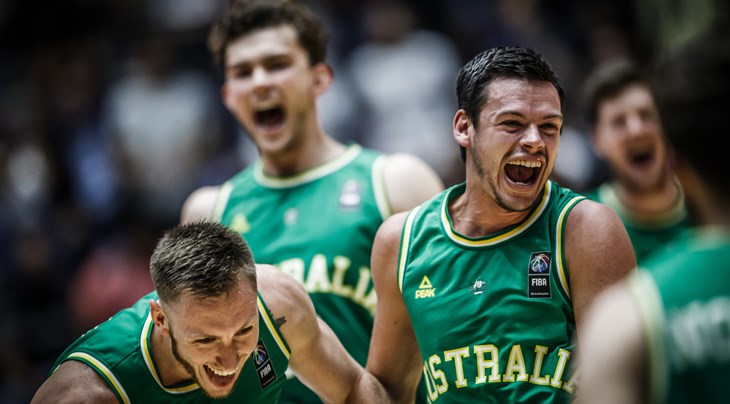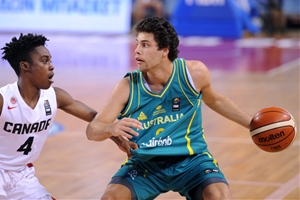
Stop the flop
MELBOURNE (Paulo Kennedy's View from Downunder) - I would like to talk a little about flopping, but first let's talk Commonwealth Games, which could be very important in the Australian Opals not flopping at next year's FIBA Women's Basketball World Cup.
While the competition level at the Gold Coast event isn't expected to be overly challenging for the fourth-ranked Opals, that's not really the point this time around.
The point is this will likely be new coach Sandy Brondello's only chance to coach the Opals until literally days before the World Cup in Spain.
It's therefore difficult to overstate how important the build-up to this tournament and the opportunity to get players and coaches familiar with each other will be.
There is also the little omen that the last time the Opals tasted gold at the Commonwealth Games in 2006 they replicated the feat at that year's World Cup.
As such, Brondello is in Australia taking in some WNBL games to assess who is performing and who deserves a look in for April’s Commonwealth Games.
After an initial squad of 18 was announced at the start of the month, to take part in a February training camp in Italy, but Brondello has now added Nicole Seekamp, Aimie Clydesdale and naturalised Perth Lynx scoring sensation Sami Whitcomb.
Whitcomb's inclusion could set the scene for a humdinger battle with Leilani Mitchell and Kelsey Griffin for the one naturalised position allowed under FIBA rules.
While Whitcomb can fill it up from almost anywhere, and Griffin was a revelation even by her high standards at the FIBA Women's Asia Cup, does the lack of genuine international-level starting point guards mean Mitchell has to get the gig?
I suspect it does, especially given her added advantage of playing under Brondello at Phoenix in the WNBA.
Flop it out
Flopping is all the talk in Australia at the moment, so I thought I'd ask who has got the enforcement of the flop right, the NBA or FIBA?
For those not familiar, FIBA entrusts its referees to monitor whether players are flopping - grossly exaggerating contact in order to try and draw a foul call - while the NBA has operated with a video review system post-game.
The penalty in FIBA play is a technical foul, often after a team warning, while in the premier American competition it is individual warnings followed by fines.
So who has it right? Well I'd argue both systems have worked well in some ways.
While the NBA enforcement has dropped away drastically after there were 87 flops identified in the first three seasons of the system, some would say that was the intention, others that it's forgotten now the topic no longer dominates discussion.
The public naming and shaming reduced the incidence, and that took the issue out of the public spotlight, so the enforcement regime had the intended impact, even if it didn't eradicate flopping from the game altogether.
The potential downfall of the FIBA system is referees have to make a split-second judgement call on the intention of the player, which is incredibly hard to do.
Thankfully, in international competition the FIBA refereeing panels generally only whistle the most egregious flops, meaning there is a low chance of howler calls.
Overreach
Unfortunately, here in Australia, although the NBL operates under FIBA rules, the league has tried to use the flopping call to make up for the previously poor officiating of the charge/block rules.
Because Australian referees have traditionally rewarded most defenders who fall backwards, it has been the standard play. So, rather than just stop calling those plays charges, referees here have been warning and/or teching the defensive player for flopping.
I'd like them to immediately go back to policing it the FIBA way of picking out the most obvious.
Firstly, that is the way our players will be officiated when the February World Cup qualifying windows come around.
Secondly, the calls are just so often wrong. Players are hit by a player moving at pace and are told they have flopped because they fell over? It is as if the referees don't understand the physics of what is taking place.
Australian Boomers and Sydney Kings guard Jason Cadee summed it up well when he said, "If you haven't played the game how do you know what a flop is?"
He was commenting after Boomers and Kings teammates Brad Newley was teched for flopping against New Zealand, when on replay he had obviously lost his balance.
Creek/Walker
Two men who rarely flop, if ever, are Mitch Creek and Lucas Walker, and they could form a scary frontcourt for Australia during the February window if current form keeps up.
Creek has become a mainstay for the in-season Boomers, and will push hard for a spot at the FIBA Basketball World Cup 2019 in China.
Walker was called into the Australian team to face Japan in Adelaide last month as injury cover for Perth teammate Angus Brandt, and made a cameo late in the game.
But with the 2.03m (6ft 8in) jumping jack a rebounding force at both ends of the court at the moment - he had 12 offensive boards two weeks ago at Adelaide - and able to help and recover with ease at the defensive end, he must be moving up in coach Andrej Lemanis' estimation.
Tonight, @Lucaswaxy becomes first @NBL player to record 12 offensive rebounds in a 40-minute game.
— NBLfacts (@nblfacts) December 8, 2017
The last @PerthWildcats player to have 12 'O'boards was Rosell Ellis in Dec 2004#ADEatPER #NBL18 pic.twitter.com/N6KAUKV5Rq
Walker could get a real crack in the main rotation against the Philippines on 22 February in Melbourne on current form, and the thought of he and the similarly-strong Creek defending multiple position, rebounding and getting into the open court is indeed a scary one for Gilas fans.
As for Creek, he's currently nursing a hamstring strain, but he still found a way to make himself useful for his Adelaide 36ers tonight in Melbourne!
RIP Blair
Lastly, it would be remiss of me not to mention the tragic passing of 1997 NBL championship winner Blair Smith.
Former teammate Andrew Gaze's press conference speaking of his long-time friend was heartbreaking, particularly because Smith was such an upbeat fellow who always seemed to have a smile on his face during his NBL career.
I can only add to Gaze's comments that it is so important to reach out to friends who may be struggling through a difficult time.
If it is you struggling, please contact one of the many services designed to help, including Beyond Blue, because there is always a light at the end of the tunnel, and there are good people out there who can help us find it if we just give the a chance.
RIP Blair.
Paulo Kennedy
FIBA
FIBA's columnists write on a wide range of topics relating to basketball that are of interest to them. The opinions they express are their own and in no way reflect those of FIBA.
FIBA takes no responsibility and gives no guarantees, warranties or representations, implied or otherwise, for the content or accuracy of the content and opinion expressed in the above article.

















